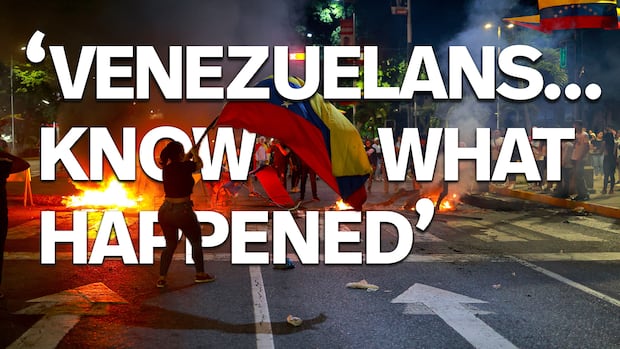Some Venezuelans in Nova Scotia concerned by state of politics at home
'In Venezuela, there's not a lot of freedom of speech,' says Halifax resident

Some Venezuelans living in Nova Scotia are concerned about the state of politics in their home country. Maria Claudia Rosario is one of them.
Rosario said she was disappointed when the government didn't release detailed vote results when it announced the victory of President Nicolás Maduro on July 28.
While Canada, the U.S. and other countries in the region want Maduro's government to prove its victory, Rosario said she is unsure of what six more years of his regime will mean.
"We wanted to believe that something could happen this time, but it didn't," said Rosario.
Ottawa did not recognize opposition candidate Edmundo González Urrutia, but Deputy Prime Minister Chrystia Freeland said Canada has concerns about the election results and the country's "increasingly severe authoritarian regime."
"In Venezuela, there's not a lot of freedom of speech," said Rosario. "So if you were to talk bad about the government, it might be detrimental for you."
Rosario moved to Halifax with her husband last April. She had already fled Venezuela in 2018 at the age of 17 to go to the U.S., claiming that the situation in her home country was becoming increasingly dire.
According to the United Nations, 82 per cent of Venezuelans live in poverty.
She said she remembers the food shortages, the long lines at the grocery store and the violent riots of 2014 and 2017 that pushed her and many of her friends to leave.
She is one of more than 7.7 million Venezuelans who have left their country, according to the United Nations High Commission for Refugees. More than 20,000 Venezuelans have relocated to Canada.
"Me and my husband are both from South America and we thought that Canada will be a great place to start our family and immigrate," said Rosario.

Asking Canada for help
Lisset Rios is another Venezuelan living in Halifax who left in 2021 due to the escalating violence.
"I didn't feel safe at work anymore," she said in an interview in Spanish. "I didn't even feel safe going to the store."
Rios even said the repeated violence makes Venezuela feel "at war."
To help Venezuelans escape that situation, Rios said she would like to see the Canadian government make it easier for Venezuelans to come to Canada.
She added that the government should be putting pressure on the Venezuelan government as a much larger and more powerful country.
"As a resident in Canada, I would like if there was more support for Venezuelan migrants with families," she said.
Immigration, Refugees and Citizenship Canada told the CBC News in an email it is "deeply concerned with the ongoing crisis" and that, while it does not offer special considerations to Venezuelans in Canada, it may consider situations on a case-by-case basis.
Individuals with an expired temporary status in Canada, such as a work or study permit, have 90 days from the date of losing their temporary resident status to apply for restoration.
WATCH | Re-election of Venezuelan President Nicolás Maduro sparks violent protests


